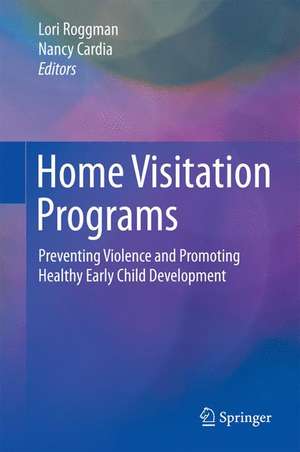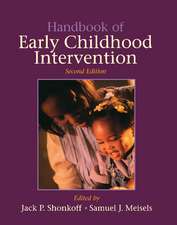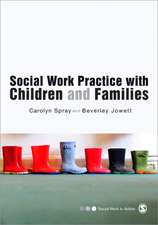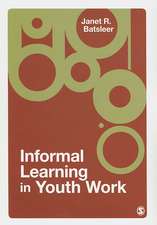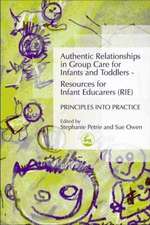Home Visitation Programs: Preventing Violence and Promoting Healthy Early Child Development
Editat de Lori Roggman, Nancy Cardiaen Limba Engleză Hardback – 28 sep 2015
- Home visitation as a primary prevention tool for violence.
- Developmental parenting home visiting to prevent violence.
- Supporting the paraprofessional home visitor.
- Engagement and retention in home visiting child abuse prevention programs.
- Addressing psychosocial risk factors among families in home visiting programs.
- Home visitation programs in the United States, Latin America, and the Caribbean.
| Toate formatele și edițiile | Preț | Express |
|---|---|---|
| Paperback (1) | 638.11 lei 6-8 săpt. | |
| Springer International Publishing – 23 aug 2016 | 638.11 lei 6-8 săpt. | |
| Hardback (1) | 644.30 lei 6-8 săpt. | |
| Springer International Publishing – 28 sep 2015 | 644.30 lei 6-8 săpt. |
Preț: 644.30 lei
Preț vechi: 758.01 lei
-15% Nou
Puncte Express: 966
Preț estimativ în valută:
123.30€ • 127.100$ • 102.81£
123.30€ • 127.100$ • 102.81£
Carte tipărită la comandă
Livrare economică 24 martie-07 aprilie
Preluare comenzi: 021 569.72.76
Specificații
ISBN-13: 9783319179834
ISBN-10: 3319179837
Pagini: 280
Ilustrații: XVI, 232 p.
Dimensiuni: 155 x 235 x 20 mm
Greutate: 0.53 kg
Ediția:1st ed. 2016
Editura: Springer International Publishing
Colecția Springer
Locul publicării:Cham, Switzerland
ISBN-10: 3319179837
Pagini: 280
Ilustrații: XVI, 232 p.
Dimensiuni: 155 x 235 x 20 mm
Greutate: 0.53 kg
Ediția:1st ed. 2016
Editura: Springer International Publishing
Colecția Springer
Locul publicării:Cham, Switzerland
Public țintă
ResearchCuprins
Part 1. Introduction to Home Visiting and its Challenges.- 1. Introduction: Home Visitation as a Primary Prevention Tool for Violence; Alberto Concha-Eastman.- 2. The Four Challenges for Home Visitation: Alcohol and Substance Abuse, Intrafamilial Violence, and Mental Disorders; Maristela G. Monteiro.- Part 2. Home Visiting Programs and Practices: Research and Evaluation.- 3. Home Visiting to Enhance Child Development in the Context of Violence: Possibilities and Limitations; Jon Korfmacher.- 4. Developmental Parenting Home Visiting to Prevent Violence: Monitoring and Evaluating; Lori Roggman.- 5. Developing the Home Visiting Workforce; Nick Wechsler.- 6. Supporting the Paraprofessional Home Visitor; Jon Kofmarcher.- 7. Engagement and Retention in Home Visiting Child Abuse Prevention Programs; William M. McGuigan and Breanna Gassner.- 8. Addressing Psychosocial Risk Factors among Families Enrolled in Home Visiting: Issues and Opportunities; S. Darius Tandon.- 9. Considerations on the Implementation, Innovation, and Improvement of Evidence-Based Home Visiting Programs; Mark S. Innocenti.- Part 3. Home Visiting Programs Outside the United States.- 10. Home Visitation Programs for Early Child Development: Experiences in Latin America and the Caribbean; Nancy Cardia, Renato Alves, Aline Gomes and Alder Mourão.- 11. Home Visiting Interventions to Promote Values that Support School Success; Martha Julia García-Sellers.- 12. The Roving Caregivers Programme: A Caribbean Model; Susan Branker, Clive Murray and Horis Lynch.- 13. The Investment In Home Visit Programs in Rural Indigenous Communities as a Strategy to Grant a Good Start in Life for Young Children; J. Leonardo Yánez.
Notă biografică
Lori Roggman, Ph.D., is Professor in the Department of Family, Consumer, and Human Development at Utah State University. She studies parenting and early intervention in relation to children’s early social, cognitive, and language development. Dr. Roggman’s career began as a Head Start home visitor and continued as a trainer and consultant for practitioners in infant/toddler and early childhood programs. She has conducted research on early parenting and on home visiting interventions to support parenting in Early Head Start and similar programs and she co-authored Developmental Parenting: A Guide for Early Childhood Practitioners. She co-developed the PICCOLO scale using 4,500 observations of parenting interactions to develop a valid, reliable, easy-to-use measure for both researchers and practitioners that gauges affection, responsiveness, encouragement and teaching. She also co-developed the Home Visit Rating Scales of home visiting quality. She has served in several technical advisory groups developing methods and measures to study services for families of infants, toddlers and young children.
Nancy Cardia, Ph.D., is Professor and Deputy Coordinator of the Center for the Study of Violence and coordinator of the activities of knowledge transfer. She represents the center as a Collaborating Centre of the World Health Organization (WHO) in the issue of Prevention of Violence at the Department of Prevention of Violence and Injuries. She has organized the series of books, Police and Society, and the series Human Rights Education. Dr. Cardia is a member of the Editing Committee of the World Report on Violence against Children (UN / UNICEF), author of a book about murders of children in Brazil (WHO/PAHO). She compiled the module of youth violence: causes and prevention for the WHO TEACH-VIP and produced, for the PAHO / GTZ, a study on how to prevent youth violence and promote healthy development. She isgeneral coordinator of the pilot deployment of the program of domestic visitation for adolescent mothers and their children: a program to promote healthy development and prevent violence and is also the coordinator of research on exposure to violence and its impact on attitudes, values, norms regarding violence, human rights, justice and democracy.
Nancy Cardia, Ph.D., is Professor and Deputy Coordinator of the Center for the Study of Violence and coordinator of the activities of knowledge transfer. She represents the center as a Collaborating Centre of the World Health Organization (WHO) in the issue of Prevention of Violence at the Department of Prevention of Violence and Injuries. She has organized the series of books, Police and Society, and the series Human Rights Education. Dr. Cardia is a member of the Editing Committee of the World Report on Violence against Children (UN / UNICEF), author of a book about murders of children in Brazil (WHO/PAHO). She compiled the module of youth violence: causes and prevention for the WHO TEACH-VIP and produced, for the PAHO / GTZ, a study on how to prevent youth violence and promote healthy development. She isgeneral coordinator of the pilot deployment of the program of domestic visitation for adolescent mothers and their children: a program to promote healthy development and prevent violence and is also the coordinator of research on exposure to violence and its impact on attitudes, values, norms regarding violence, human rights, justice and democracy.
Textul de pe ultima copertă
This timely resource analyzes home visits as a primary intervention for at-risk families with infants and young children and details innovative programs for home service delivery. Focusing on family violence, mental illness, and alcohol and substance abuse as major challenges to child development, the book presents practical strategies for home visitors to address and prevent problems while fostering an improved environment for raising children. Contributors offer a realistic framework for planning, developing, and training an effective home visitation workforce and tailoring interventions to fit individual family dynamics. And the book's international focus provides a variety of perspectives on evidence-based programs that support families raising children in distressed neighborhoods.
Among the featured topics:
Among the featured topics:
- Home visitation as a primary prevention tool for violence.
- Developmental parenting home visiting to prevent violence.
- Supporting the paraprofessional home visitor.
- Engagement and retention in home visiting child abuse prevention programs.
- Addressing psychosocial risk factors among families in home visiting programs.
- Home visitation programs in the United States, Latin America, and the Caribbean.
Caracteristici
Synthesizes the broad evidence-based research in home visitation program evaluation Offers individualized infancy and early childhood services adaptable across global, cultural and community contexts Provides models and designs for planning, implementing and improving home visitation programs Discusses best practices for helping parents provide appropriate care and developmental support for infants and young children Includes supplementary material: sn.pub/extras
